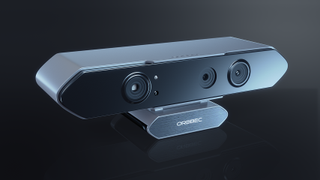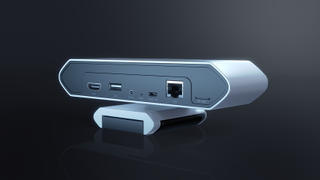Orbbec Reveals Persee, A 3D Camera With Built-in Computer

Orbbec, a Seattle-based company that manufactures 3D cameras and sensors, believes that the future of computing is in intelligent computing, and it asserts that computer vision will be necessary. It believes that 3D cameras are an integral component to achieve that goal. The company already sells the Astra 3D camera, and it has now revealed two more products coming to market.
Orbbecs latest effort, Persee, has just been revealed, and the company launched a crowdfunding campaign to bring it to the masses. Persee is a unique device that combines a 3D, depth perceiving camera, with an integrated ARM computer allowing it to run local applications without an external processing source.
The CPU in Persee is a quad-core ARM Cortex A17 that runs at up to 1.8 GHz, and it is paired with a 600 MHz Mali-T7 GPU that has support for OpenCL. Persee features 2 GB of DDR3 memory, and internal storage is handled by a 16 GB eMMC flash chip. It is expandable by up to 64 GB with a MicroSD card.
Orbbec included plenty of communication options in the Persee. It includes a built-in Ethernet jack for wired network connectivity. It also includes dual-band 2.4 GHz/5 GHz Wi-Fi and a built-in Bluetooth antenna. There is a single USB 2.0 port, which Orbbec said can be used for input devices such as a keyboard and mouse, or extra storage through a USB hard drive. Persee also has a single HDMI 2.0 output to make use of a display.
Orbbec sees many potential uses for the Persee cameras, including 3D film creation, robotics, gesture-controlled TVs, and even reactive digital signage. But mostly, the company is excited to see what people create with the technology. To make it accessible, and compelling for the widest possible audience, Orbbec is shipping the Persee with two operating systems in a dual-boot configuration.
Persee will run Android and Ubuntu (Linux). Orbbec chose this path because Android is so widely used, and there are many developers for the platform, though it is limited in its capabilities. Ubuntu can offer lower level access to the hardware, thus allowing for more complex applications to be created. Orbbec feels this will cater to the widest audience possible.

Orbbec will be releasing an SDK for Persee that will include cross-platform drivers and tools that are compatible with Windows, OSX, Linux and Android devices, allowing developers to write code for Persee from whichever platform they have access to (or prefer). The company is also embracing the hacker mindset and welcomes tinkering and taking the camera apart. Orbbec even said that there is additional functionality that is not accessible while the hardware is in the enclosure, though it would not comment on what the extra functions are.
Stay on the Cutting Edge
Join the experts who read Tom's Hardware for the inside track on enthusiast PC tech news — and have for over 25 years. We'll send breaking news and in-depth reviews of CPUs, GPUs, AI, maker hardware and more straight to your inbox.
Astra Pro
In addition to Persee, Orbbec has also launched the Astra Pro camera. Astra Pro is designed to be plugged into a PC through USB 2.0 and used as a connected device. It does not have any computational power and requires a computer to process the data the Astra Pro perceives. This device is a higher resolution version of the already-available Astra 3D camera, and it shares the same optics as the Persee camera.
Orbbec said the Astra can be used as a test platform for developers creating applications for Persee, or it can be used for its own purposes. An example that Orbbec described would be full body scanning from multiple cameras at once. The ARM processor in the Persee is not robust enough to handle the data from multiple sources at once, but a PC with multiple Astra Pro cameras could do instant 3D scans of objects or bodies.
The Astra Pro camera records 3D point cloud data in VGA 640 x 480 resolution at 30 frames per second, and records color images in 720p at 30 frames per second. The Persee camera shares the same optics as the Astra Pro. Both cameras are capable of perceiving depth as near as 0.4m and as far an 8m, and it measures in millimeter increments. Orbbec said that depth measurements are accurate within 0.5 centimeters from distances of 2m.
Orbbec has launched an Indiegogo campaign to bring the cameras to market and is offering deep discounts for backers. The company is offering the full line of Astra cameras, Astra, Astra S and the new Astra Pro for $99 to the first 500 backers. Orbbec said the Astra cameras are already in production and will ship to backers immediately after the campaign closes at the end of the month.
Most of the funding project is for the Persee camera. Orbbec is offering several pricing tiers for the Persee, with the biggest discounts available to the earliest backers. The first 250 backers will receive a Persee for $179, after which time the price will scale up to $199 for the next 500 backers, and $209 after the first 750 are sold. Orbbec expects to ship the first batch of Persee cameras in February of next year.
update 10/1/15 3:10pm PT: The article was originally published with Purcee as the name, though the product name is actually Pursee.
Follow Kevin Carbotte @pumcypuhoy. Follow us @tomshardware, on Facebook and on Google+.
Kevin Carbotte is a contributing writer for Tom's Hardware who primarily covers VR and AR hardware. He has been writing for us for more than four years.
-
phantomferrari this is the real problem nowadays. we have some pretty cool/powerful hardware with next to no applications to run on them.Reply
Most Popular


